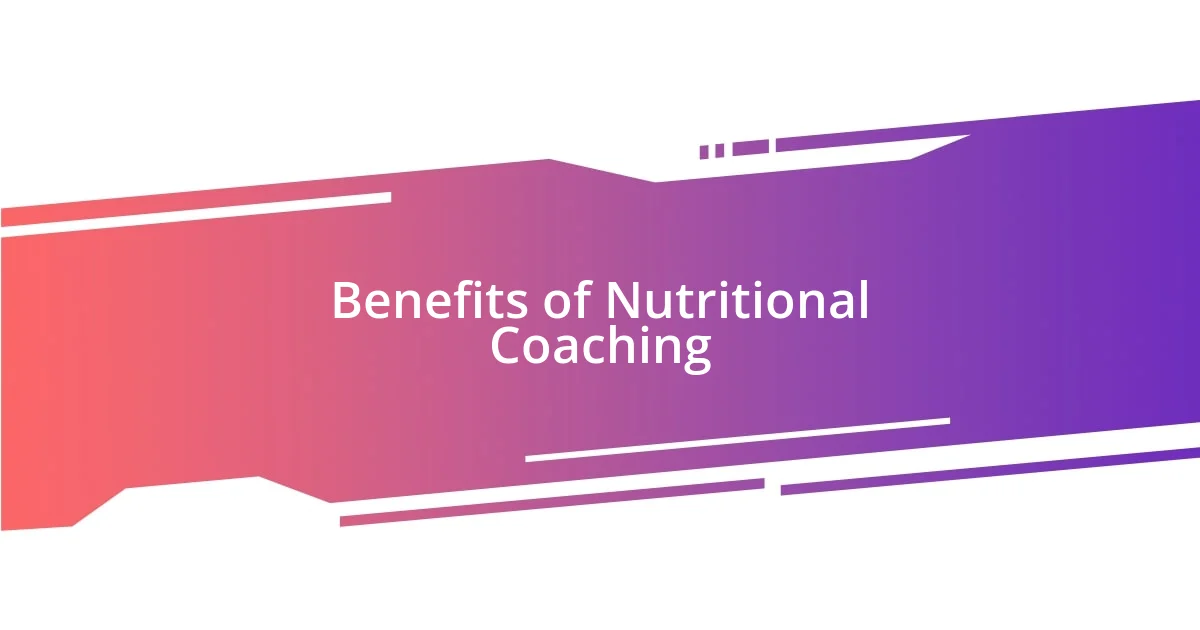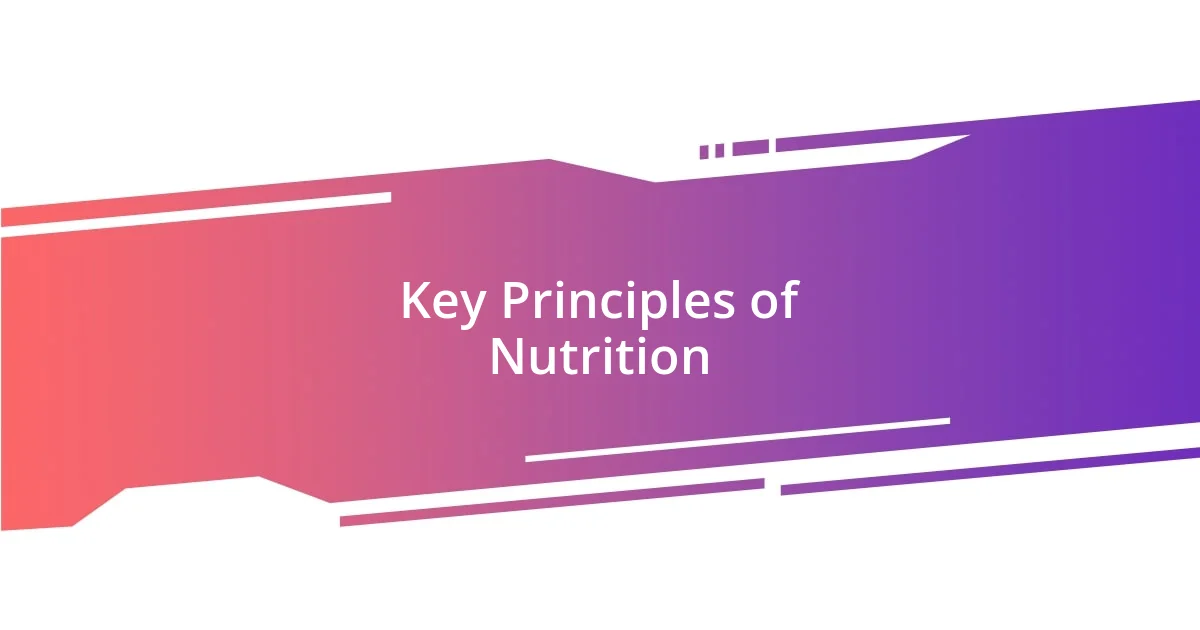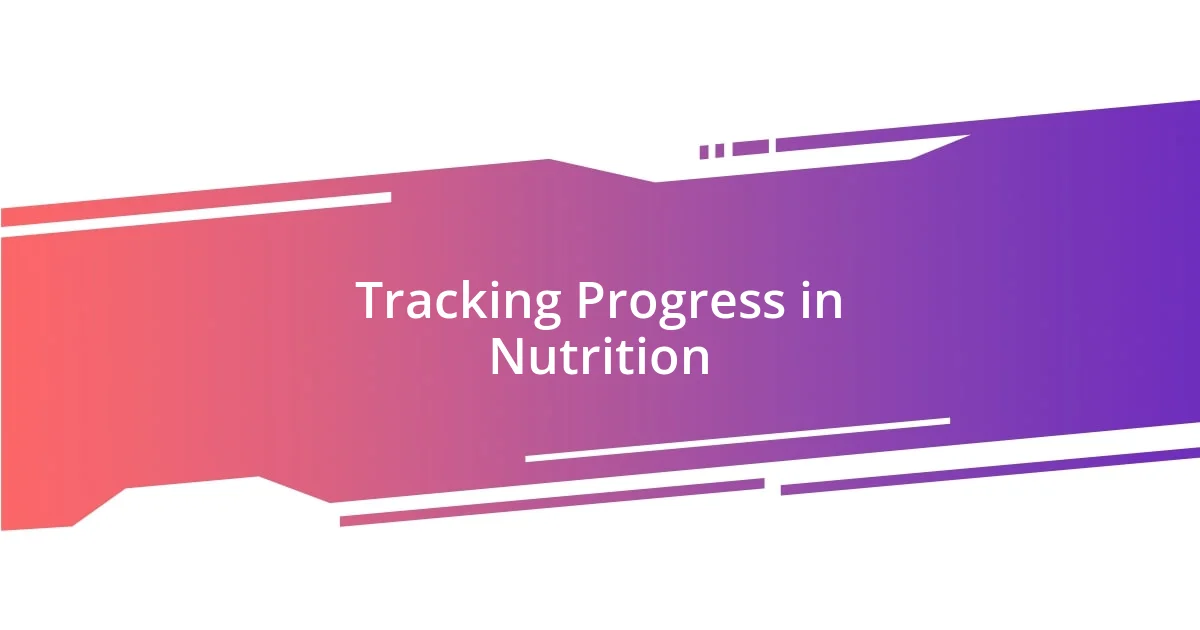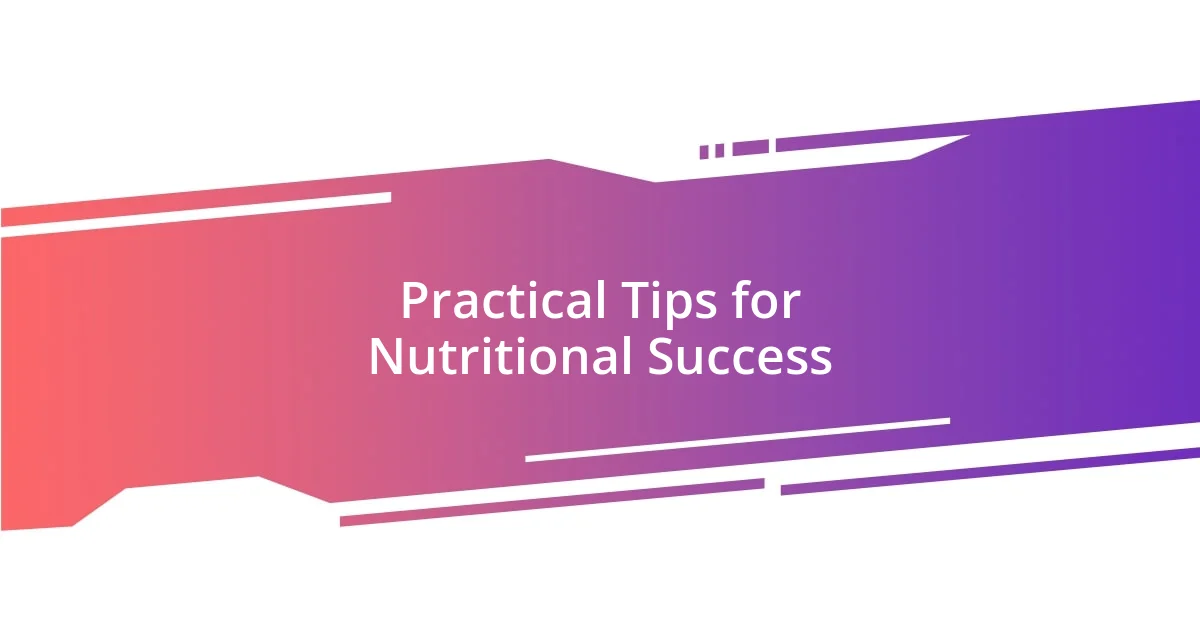Key takeaways:
- Nutritional coaching offers personalized guidance, accountability, and knowledge empowerment, enabling individuals to develop healthier eating habits while enjoying their favorite foods.
- Key principles of nutrition emphasize balance, whole foods, understanding macronutrients, mindful eating, and hydration, which collectively foster a harmonious relationship with food.
- Practical strategies such as meal prepping, adopting a flexible approach to dieting, and involving a support system can significantly enhance nutritional success and overcome common challenges.

What is Nutritional Coaching
Nutritional coaching is a personalized approach to nutrition that focuses on guiding individuals toward healthier eating habits and lifestyle choices. I remember my first session vividly; I walked in with a list of dietary restrictions and a confused mind, wondering how I could possibly make sense of it all. It’s fascinating how tailored advice, based on my preferences and challenges, transformed my understanding of food.
At its core, nutritional coaching involves one-on-one support to help clients set realistic goals and develop strategies for lasting change. Have you ever felt overwhelmed by conflicting diet advice? That was me before I found my coach, who patiently unraveled the complexities. It was like having a nutrition detective by my side, decoding not just what to eat, but why it matters for my overall well-being.
This coaching often includes meal planning, education on food choices, and accountability, making it a holistic experience. I still recall how empowering it felt to learn about the nutritional value of my favorite foods rather than being told to give them up. Isn’t it remarkable how understanding your food can shift your entire relationship with it?

Benefits of Nutritional Coaching
Nutritional coaching offers a unique opportunity to develop a personalized approach to eating, tailored to individual needs and goals. I found that the clarity I gained about my food choices was invaluable; it shifted my perspective from a rigid diet to a flexible lifestyle. It was liberating to learn that nourishing my body didn’t mean sacrificing enjoyment; I discovered how to integrate my favorite foods in a balanced way.
One of the most significant benefits I experienced was the accountability that comes from working with a coach. Having someone to check in with pushed me to stay committed to my goals. During our weekly meetings, I sensed a genuine connection—my coach celebrated my victories and helped me navigate the inevitable setbacks. This supportive environment made all the difference, as it encouraged me to keep pushing forward even on tough days.
Ultimately, nutritional coaching equips individuals with the knowledge and skills to make informed decisions. I used to find myself lost in nutrition labels, unsure of what to prioritize. Thanks to coaching, I learned how to read them effectively, which made grocery shopping a breeze. The confidence I developed in making healthier choices permeated into other aspects of my life, leaving me feeling empowered and excited about my journey.
| Benefit | Personal Insight |
|---|---|
| Personalized Guidance | Customized plans made me realize that nutrition is not one-size-fits-all. |
| Accountability | Having my coach check in kept me motivated and on track. |
| Knowledge Empowerment | Learning to read labels transformed my shopping experience and boosted my confidence. |

Key Principles of Nutrition
The landscape of nutrition can often feel overwhelming, but some key principles have guided my journey through nutritional coaching. One major takeaway for me is that balance is crucial. Instead of obsessing over what I couldn’t eat, I learned to appreciate the diverse range of foods that nourished me. Now, I embrace meals filled with colors, flavors, and nutrients. It’s like painting a masterpiece on my plate!
Here are some key principles that I recognized along the way:
- Whole Foods Over Processed: I discovered that whole foods are rich in nutrients and leave me feeling satisfied, while processed options often lead to cravings.
- Macros Matter: Understanding macronutrients—proteins, fats, and carbohydrates—helped me tailor my meals, ensuring I get the right fuel without feeling deprived.
- Listen to Your Body: This was one of my biggest learning curves. I used to ignore hunger cues, but now I prioritize eating when I’m hungry and stopping when I’m full, which fosters a healthier relationship with food.
- Mindful Eating: I found joy in savoring each bite, which transformed my meals from mere refueling to a delightful experience.
- Hydration is Key: It’s amazing how much better I feel by simply staying hydrated. Water became my go-to drink, making a huge difference in my daily energy levels.
As I navigated these principles, I was surprised by how much my mindset shifted. It felt liberating to break free from rigid dieting rules and allow myself to find joy in the process of nourishing my body. Each step guided me to a more balanced approach that I genuinely appreciated, both physically and emotionally.

Setting Realistic Nutrition Goals
Setting realistic nutrition goals isn’t just a box to tick; it’s about carving a path that feels achievable. When I first began, I had grand aspirations—like cutting out carbs altogether or only eating raw foods. But I quickly learned that such extreme measures led to frustration and disappointment. Instead, I started setting smaller, specific goals, like incorporating a vegetable into every meal. This shift made a world of difference, as I could celebrate those simple victories without feeling overwhelmed.
One strategy that worked well for me was the SMART method—Specific, Measurable, Achievable, Relevant, and Time-bound. I remember when I committed to drinking an extra glass of water each day. It wasn’t a huge leap, but it was attainable. Over time, that seemingly small goal transformed my hydration habits significantly. Have you ever noticed how just a little consistency can lead to large changes? It’s refreshing to see how those humbler objectives laid the groundwork for greater dietary improvements later on.
Additionally, I found that aligning my goals with my lifestyle significantly boosted my motivation. For instance, I live a hectic life, often rushing from one commitment to the next, so I decided to prep my meals on Sundays. This goal was realistic because it fit seamlessly into my schedule. As I continued to prioritize my nutrition, I felt more energized, which further fueled my desire to maintain these positive changes. Building my goals around what truly fit my life helped me foster a sense of balance that I had previously thought unattainable. Have you tried approaching your nutrition goals from this angle? It might just be the game-changer you need!

Tracking Progress in Nutrition
Tracking progress in nutrition has been a transformative aspect of my journey. I used to rely on the scale as my main indicator, but I quickly realized it was only part of the story. Since then, I’ve started keeping a food journal, not just to log what I eat, but to highlight how food affects my mood and energy. Can you remember a time when a specific meal boosted your day? For me, those entries became a window into how my nutritional choices influenced my overall well-being.
Incorporating regular check-ins with myself also made a huge difference. I began to ask questions like, “How do I feel after eating this?” or “Am I genuinely satisfied, or am I still craving something?” These reflections helped me understand what truly nourished me beyond just calories. I found that my body responds differently to various foods, and tuning into those nuances helped me make healthier choices. Have you ever stopped to think about your feelings surrounding food? It’s eye-opening to acknowledge the emotional connection we often have with our meals.
Tracking progress isn’t just about numbers; it’s about the journey and the discoveries along the way. I started taking note of non-scale victories too—like feeling more energized after swapping out processed snacks for fruits and nuts. Celebrating those wins kept me motivated and reinforced my commitment to long-term changes. Have you ever celebrated the little victories that make the big difference? Embracing this holistic approach to tracking has truly shifted my perspective on what it means to progress in nutrition.

Overcoming Common Nutrition Challenges
When it came to overcoming common nutrition challenges, one of my biggest hurdles was the onslaught of quick and unhealthy meal options. I found myself reaching for convenience when busy, often opting for fast food or pre-packaged meals that left me feeling sluggish. A breakthrough came when I decided to dedicate a bit of time each week to batch cooking. Just on Sundays, I’d prepare several healthy meals that I could refrigerate or freeze. Discovering this simple hack not only saved me time during the week but also transformed my eating habits. Have you tried meal prepping? It’s amazing how reshaping your approach can turn obstacles into manageable routines.
Another challenge I encountered was social situations, particularly dining out. I often felt pressured to indulge in rich dishes or skip healthy choices altogether. It wasn’t easy at first, but I started to focus on balancing my plate instead of feeling deprived. For instance, if I chose a creamy pasta, I made sure to order a side salad. This way, I could still enjoy the experience while maintaining a sense of control over my choices. Reflecting on those moments now, I realize how liberating it can be to embrace moderation rather than falling into the trap of all-or-nothing thinking. Have you ever felt similar pressures? Finding balance in social settings can be a game-changer.
Lastly, emotional eating sometimes crept in when stress levels soared. I vividly remember one particularly hectic week where I reached for comfort foods instead of nourishing my body. It took a moment of self-reflection for me to realize that food was not the solution to my stress but rather an escape. I started finding alternative ways to cope, like going for a brisk walk or engaging in a hobby I love. This shift helped me confront the emotions instead of trying to mask them with snacks. It’s a powerful reminder that recognizing our emotions plays a crucial role in making healthier choices. How do you manage emotional cravings? It’s an ongoing journey, but every step counts.

Practical Tips for Nutritional Success
When I first started my nutritional journey, one practical tip that made a world of difference was the idea of “eating the rainbow.” I remember standing in the grocery aisle, truly challenged to incorporate a variety of colorful fruits and vegetables into my meals. That simple visual cue transformed how I viewed my plate. Instead of only focusing on macronutrients, I began to see the value in the nutrients and antioxidants that different colors bring. Have you ever noticed how a vibrant plate can instantly uplift your mood? It does wonders in making meals feel joyful and nourishing.
Finding a sustainable routine is another key to nutritional success. I learned the hard way that strict diets rarely last. Instead, incorporating flexibility became a game changer for me. For example, I started allowing myself a weekly treat, like dark chocolate or a few slices of pizza. Initially, I struggled with this concept—wasn’t it counterproductive? Yet, when I embraced moderation, I found that my cravings diminished and I enjoyed these little indulgences guilt-free. Isn’t it interesting how our perspective on food can reshape our relationship with it?
Lastly, I cannot stress enough how beneficial it is to involve others in your nutritional goals. Early in my journey, I invited a friend to join me on meal prep Sundays. Sharing that experience turned what felt like a chore into something we both looked forward to. We’d experiment with new recipes and share our individual successes and struggles. Connecting with others created a sense of accountability and made the process much more enjoyable. Have you considered how partnering with someone could enhance your own nutritional journey? I promise you’ll discover not just new recipes, but also a shared sense of accomplishment along the way.















